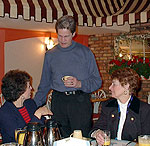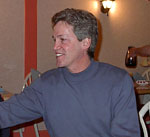By Mark Zdechlik
Minnesota Public Radio
June 3, 2002
This summer Minnesotans can expect to see and hear a lot from Republican Senate candidate Norm Coleman and DFL incumbent Paul Wellstone as the two engage in a election contest that'll cost millions of dollars and could shift power from Democrats to Republicans in the U.S. Senate. For Coleman support from voters in rural Minnesota could be critical. Polls have shown Coleman and Wellstone are running neck and neck statewide but that Wellstone enjoys a comfortable lead over Coleman in greater Minnesota. Not surprisingly, Coleman is campaigning aggressively outside the metro area, mixing farm policy with his broader campaign themes.
| |
|
|
|
||
It's early in the morning - barely 8 a.m. - and about 30 people are gathered in a back room at Toby's restaurant in Hinckley to hear from Republican Senate candidate Norm Coleman. Some of them are quite literally overjoyed the former St. Paul mayor is taking on Democrat Paul Wellstone.
Local Republican organizers pass out envelopes for campaign contributions as Coleman works the room, telling supporters he's humbled by their encouragement.
"In the end, though, you win by the grass roots. You win by people talking to friends. Talking and saying, 'hey, this is important we need leadership that gets things done.' I've got a record of that. Look at what Norm Coleman has done," Coleman tells the crowd.
"I'm running against Paul Wellstone and this race is a race of contrast in so, so many ways. It's a race of contrast on issues. Paul Wellstone is probably the biggest spender -- the biggest spender in the United States Senate. The most consistently in favor of taxing everything across the board. That's what he's about. That's his vision."
Coleman walks through a litany of issues on which he disagrees with Wellstone. There's defense spending, welfare reform, school testing, and Coleman's opposition to legalized abortion.
Stark ideological contrasts aside, Coleman tells the group in Hinckley his record of accomplishment dwarfs Wellstone's.
|
"He has got a very much urban identity... He's got a selling job to do."
- Stephen Schier, Carleton College |
"Judge me, Norm Coleman, by what I've done. By my ability to bring people together and my ability to make good things happen. You can measure it versus a guy who's been there 12 years; 12 years, which by the way is the time when your kids go at first grade to the time they graduate high school. If you're there, get the job done. Be measured by your ability to get the job done. I think that's fair."
Between now and November, Coleman will be spending a lot of time campaigning in rural Minnesota for good reason. A Star Tribune Minnesota Poll released earlier this year found that although statewide Wellstone and Coleman are in a dead heat, Wellstone is running 15 points ahead of Coleman outside of the Twin Cities metro area.
"I don't think it's saying too much to say that the ability of Norm Coleman to improve his standing in greater Minnesota is an essential element in a formula for victory this fall," Coleman says.
Carleton College political science professor Steven Schier says Coleman faces major obstacles outstate; his political successes are tied exclusively to St. Paul and he sounds like an outsider.
"He has got a very much urban identity. He did grow up in New York City. He did become mayor of one of the largest cities in the state and he's got a Long Island accent that sounds a bit unnatural in Pipestone, so he's got a selling job to do," says Schier.
Four years ago in his first statewide test with voters as a candidate for governor, Democrats questioned Coleman's knowledge of rural issues. And they accused Coleman of writing off family farmers.
| |
|
|
|
||
Still Coleman won more non-metro votes than did DFLer Skip Humphrey or Reform Party candidate Jesse Ventura. And in his bid for support statewide this time, Coleman began early heading off criticism he's out of touch with rural Minnesota.
In a radio spot which, aired for several weeks earlier this year outside of the metro area, Coleman talked plenty about farm policy.
He sees increased trade as a big part of the solution to low crop prices. And he supports ethanol and biodiesel fuel production as ways to boost demand for corn and soybeans. Coleman also says there's a role for government crop price supports like those in the farm bill which both Wellstone and the Bush administration recently supported.
But even in ads designed for non-metro voters, Coleman hits hardest his broader campaign theme: He can do for Minnesota what he did for St. Paul.
Coleman insists it's his core message of lower taxes, less regulation and coalition building that will sell most effectively regardless of where he is in Minnesota.
"My challenge is to get out here (in rural Minnesota)," Coleman says. "But in the end in terms of the value system that folks reflect out here, I think they appreciate the fact that I didn't raise taxes for eight years, they appreciate the 18,000 new jobs in St. Paul, they appreciate my ability to work in a way which brings the business community to the table, works in a bipartisan way. I think folks here are very pragmatic, very results oriented so I feel very comfortable. I humbly say that I'm going to get a lot of votes in these areas."
And Coleman notes, although Democrat Al Gore carried Minnesota in 2000 presidential election, George Bush did very well in rural Minnesota. The president, who asked Coleman to take on Wellstone in the Senate race, has already campaigned twice for Coleman in Minneapolis and in St. Paul and Coleman is expecting help from the White House in rural parts of the state as well.
More from MPR

